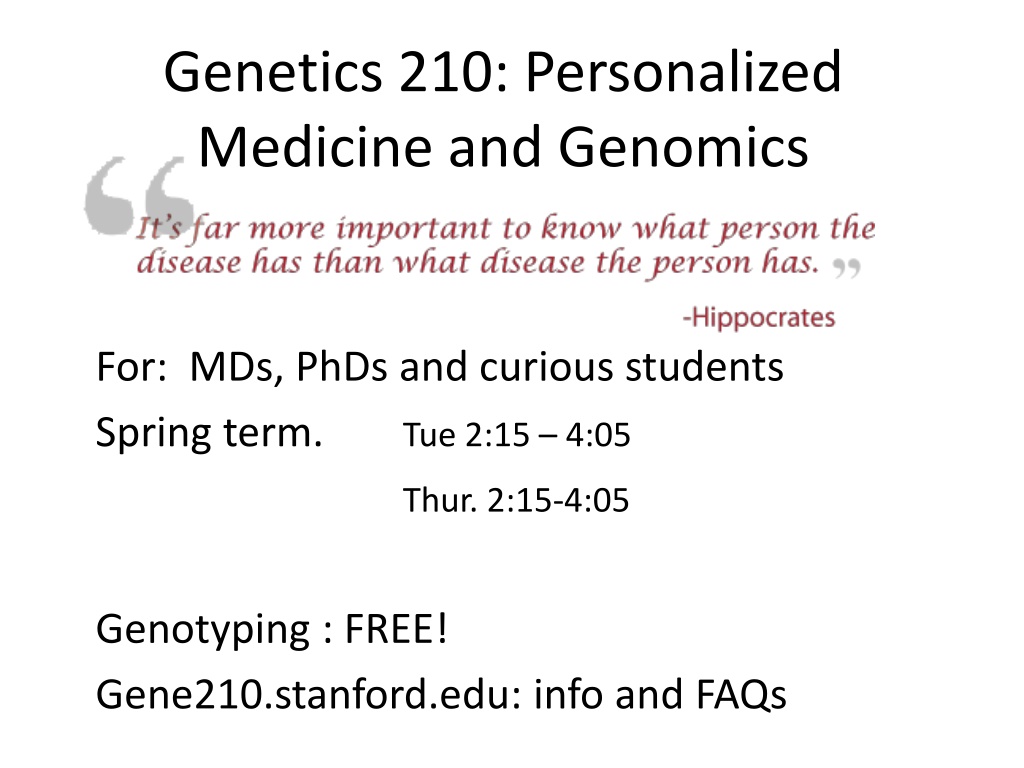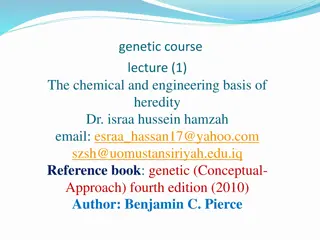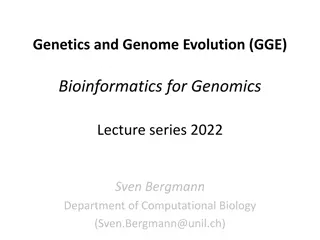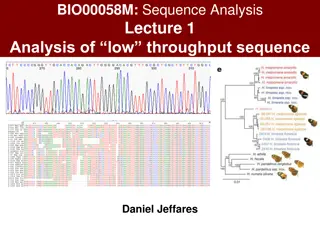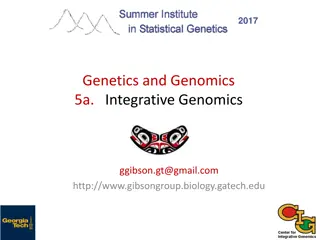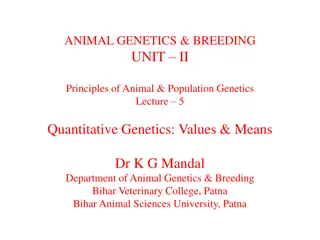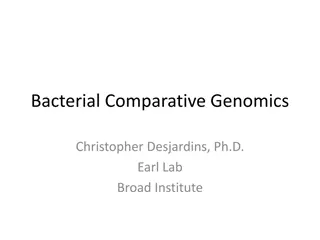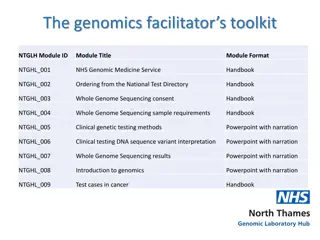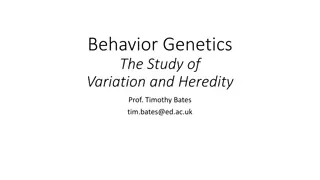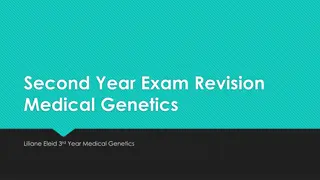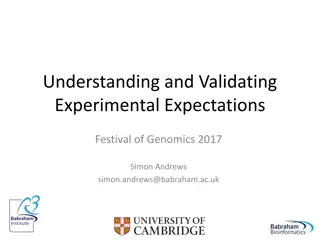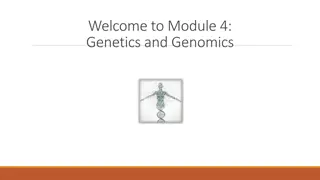Genetics 210: Personalized Medicine and Genomics Course Overview
Genetics 210 is a course focused on personalized medicine and genomics designed for MDs, PhDs, and curious students. The course covers topics such as genotyping, informed consent, and exploring specific genetic loci. Students engage in projects like annotating genomes and debating FDA regulations. The course is organized by experts in genetics and offers hands-on experience with DNA testing. Additional resources include recommended textbooks and articles in scientific publications.
Download Presentation

Please find below an Image/Link to download the presentation.
The content on the website is provided AS IS for your information and personal use only. It may not be sold, licensed, or shared on other websites without obtaining consent from the author. Download presentation by click this link. If you encounter any issues during the download, it is possible that the publisher has removed the file from their server.
E N D
Presentation Transcript
Genetics 210: Personalized Medicine and Genomics For: MDs, PhDs and curious students Spring term. Tue 2:15 4:05 Thur. 2:15-4:05 Genotyping : FREE! Gene210.stanford.edu: info and FAQs
Today Course overview (~20 ) Informed consent (~20 ) How to get genotyped (~10 ) Questions Optional: pickup 23andme kit and spit (~15 )
Course Staff Course Organizers: Stuart Kim (Dev. Bio., Genetics) Aaron Gitler (Genetics) TAs: Andrew Roos (Epidemiology) Rachel Goldfeder (BMI)
Introductory Projects Report on specific genetic locus. Published on SNPedia.com Unanticipated opportunities that arise as you explore your genome
Advanced Projects = (project + final) Annotate genome of your family Write a grant for Kaiser-Permanente GWAS (n=110,000) Make a class video for you tube Run a class debate on the FDA regulations of DNA information
Gene210 Three Manuscripts Textbook Patent Grant iPhone App in the news Chicago Medicine Magazine (story on page 18) Salon Web Magazine (9/2013) Stanford Medicine - DNA testing improves learning (8/13) San Jose Mercury News (5/2013) Time (2/2013) Nature USA Today San Francisco Chronicle Recap San Francisco Chronicle Genome Technology Stanford Press Release Nature Blogs LA Times Blog Genome Web Center for Genetics and Society Scientific American
Exploring Personal Genomics Available at Amazon.com
Joint Genotyping Task Force 2008-2010 Charles Prober Dean Russ Altman Genetics Pat Brown Biochem. Mike Grecius Neur. Carlos Bustamente Gen. Harry Greenberg Dean Ralph Horwitz Psych Anne James Legal Counsel Stuart Kim Dev. Bio. Phil Lavori HRP Kelly Ormond Genetics Alan Schatzberg Psych. Mike Snyder Genetics Keyan Salari Med. School Hank Greely Law School C. Braddock Med School Gil Chu Biochem Sean David Med. School Louanne Hudgins Epi Jesse Karmazin Med. School Mark Krasnow Biochem David Magnus Cen. BME Atul Butte BMI Mildred Cho Pediatrics
Genetics 210: Personalized Medicine and Genomics Less Stressful Information Diabetes Heart Disease Osteoporosis Schizophrenia Obesity Not tested Huntington s Most BRCA1 mutations
Genetics 210: Personalized Medicine and Genomics Potentially Stressful Information Breast Cancer (BRCA1) Cystic Fibrosis Carrier Alzheimer s (APOE4) Parkinson s (LRK2) False parenthood!
Psychological outcome from genetic information Anxiety/Stress Confusion Impact on family: Results reveal information about other family members
How Neanderthal are you? George Church, Harvard Geneticist Neanderthal
Stuart All time record
Personal Genotyping Voluntary. You can use a public genome file instead of your own. Confidential instructors will not know who opted to be genotyped. You can use anonymous genomes to do the class exercises. Private Your own DNA information will not be revealed. Counseling - genetic counseling via 23andMe and medical/psychological counseling via Dr. Alan Schatzberg (Psychology, Stanford).
23andme 1. Use your data for research 1. 42 Research Surveys (voluntary) 2. 23andme sells data to Pharma 2. Data stored at 23andme 3. Allow sharing with other users
Genetic Information Non- discrimination Act (2009) Prevents health insurance plan from collecting genetic information including family medical history prior to, or in connection, with enrollment. Prevents employers from requesting genetic information prior to employment
What GINA does not do No protection against life insurance, disability insurance, or long term care insurance Apply to diagnosed conditions Apply to employers with fewer than 15 employees Certain groups: Members of the US Military Veterans receiving care through the VA Federal employees enrolled in the Federal Employees Health Benefits Individuals using the Indian Health Service Professional Athletes?
If you have questions or concerns before or after testing: Genetic counseling (paid by Stanford) Psychological counseling (Alan Schatzberg Dept. Psych. Stanford)
How to get genotyping kits 1. 2. 3. 4. Attend this information session. Fill out informed consent form Plan A: Get kit at end of class. Give kit to TA. Plan B: Go to Sue Elliot, Beckman B300 and pick up kit. Bring samples back to Sue B300 We will ship the group of samples back to company Tuesday Jan. 29!! Results in 6-8 weeks. Class starts Tuesday March 31, 2015. 5. 6. 7.
Kit Information 1. 2. 3. SPIT. Fill out informed consent form! Fill out sign out sheet with bar code, name, dept. This is in case the sample needs to be redone and we need to contact you. If you bring in your sample to Sue Elliot (Beckman B300), we can mail them in together. This class has VIP status, so might lower your chance of getting lost in the shuffle if they go in as a group. Mail in yourself. 4. 5.
